
How Many Meals Should You Eat Per Day While Bulking?
Bodybuilders used to think that they needed to eat seven meals per day while bulking. They thought that if they didn’t eat often enough, their bodies would shift into “starvation mode,” which would cause them to gain less muscle and store more body fat. Some of them would even wake up in the middle of the night to have a protein shake.
Now that intermittent fasting is becoming popular, that idea is starting to die out. Instead of eating seven meals per day, it’s common for bodybuilders to experiment with eating as few as 1–2 meals per day. But there’s a problem here, too. Going through periods of fasting slows down our muscle growth. (A couple of new studies also found that fasting can affect our hair.)
The good news about intermittent fasting becoming more popular is that there’s now quite a bit of research comparing different meal frequencies for muscle growth.
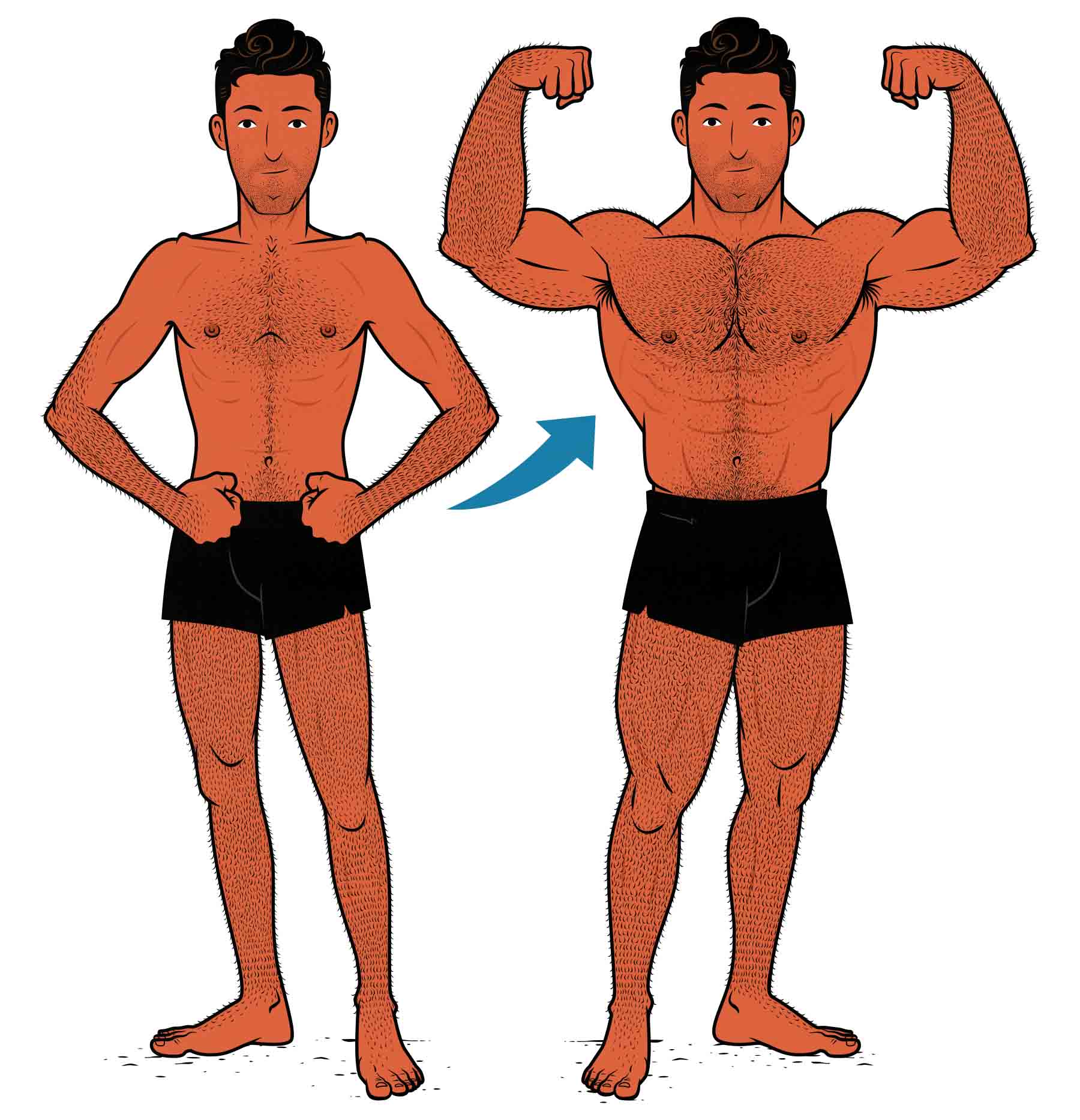
Why Do Bodybuilders Eat So Often?
To bulk up, you need to eat more calories than you burn. And as you start eating more calories, your body shifts into grow-and-spend mode, and your metabolism revs up. Part of that is because you’re gaining muscle and carrying around more weight (full explanation). But eating more food also gives you more energy, improving workout performance and increasing your activity levels.
Naturally skinny guys tend to have especially adaptive metabolisms. When we eat more calories, our bodies store less of the extra energy as fat and instead spend more of the energy on being more active. This can give us surprisingly high metabolisms, especially when we’re trying to gain weight. It can also allow us to bulk quite leanly:
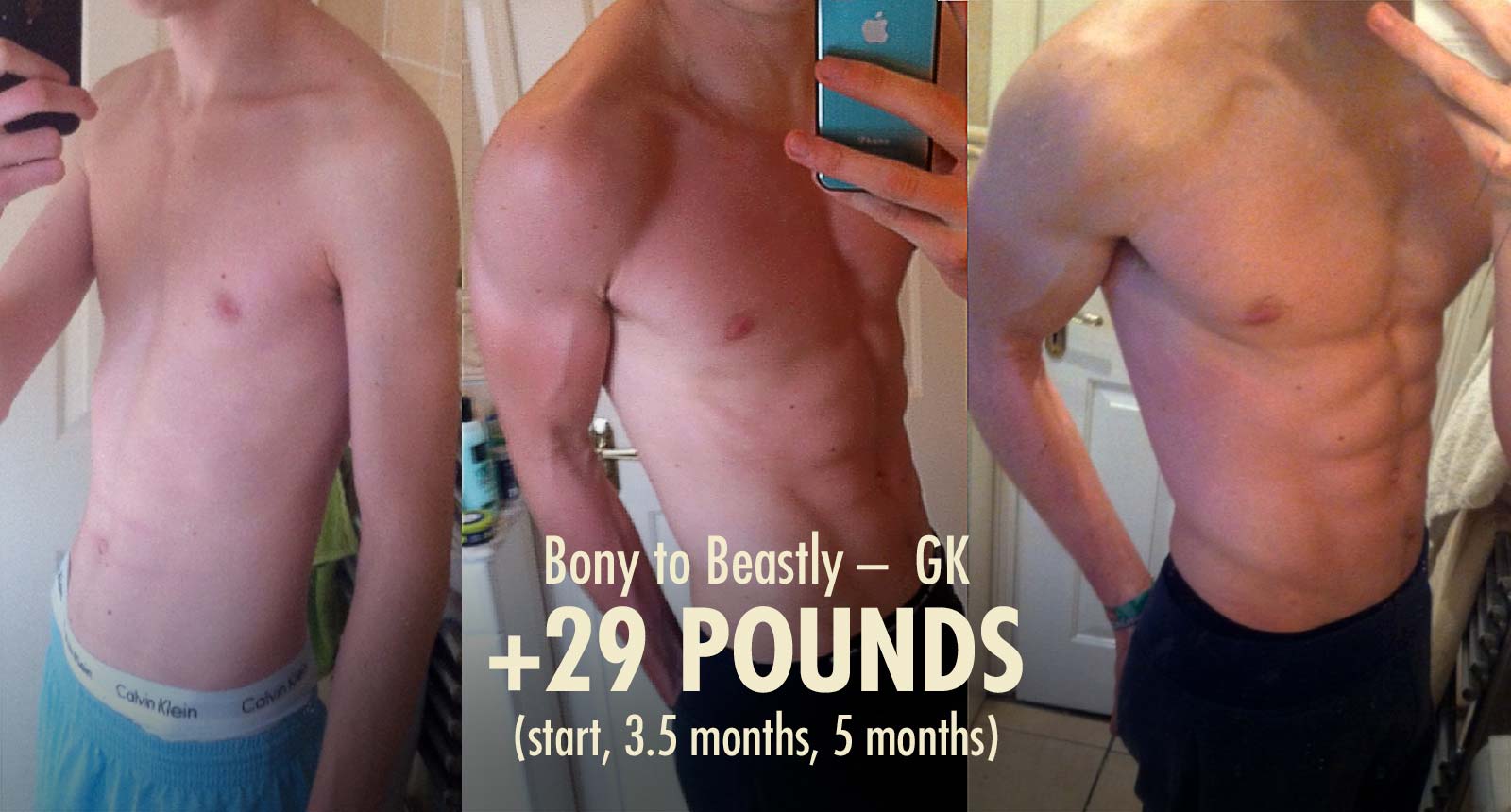
But the point is, eating enough calories to gain weight can be hard, especially for big bodybuilders carrying around a ton of muscle mass, and especially for naturally skinny guys with fast metabolisms.
The main reason bodybuilders eat so often is that it makes it easier to eat more calories. The more often you eat, the smaller your meals need to be, and so the less likely you are to feel hot, sluggish, and tired afterwards. You’re also less likely to run into digestive problems like acid reflux.
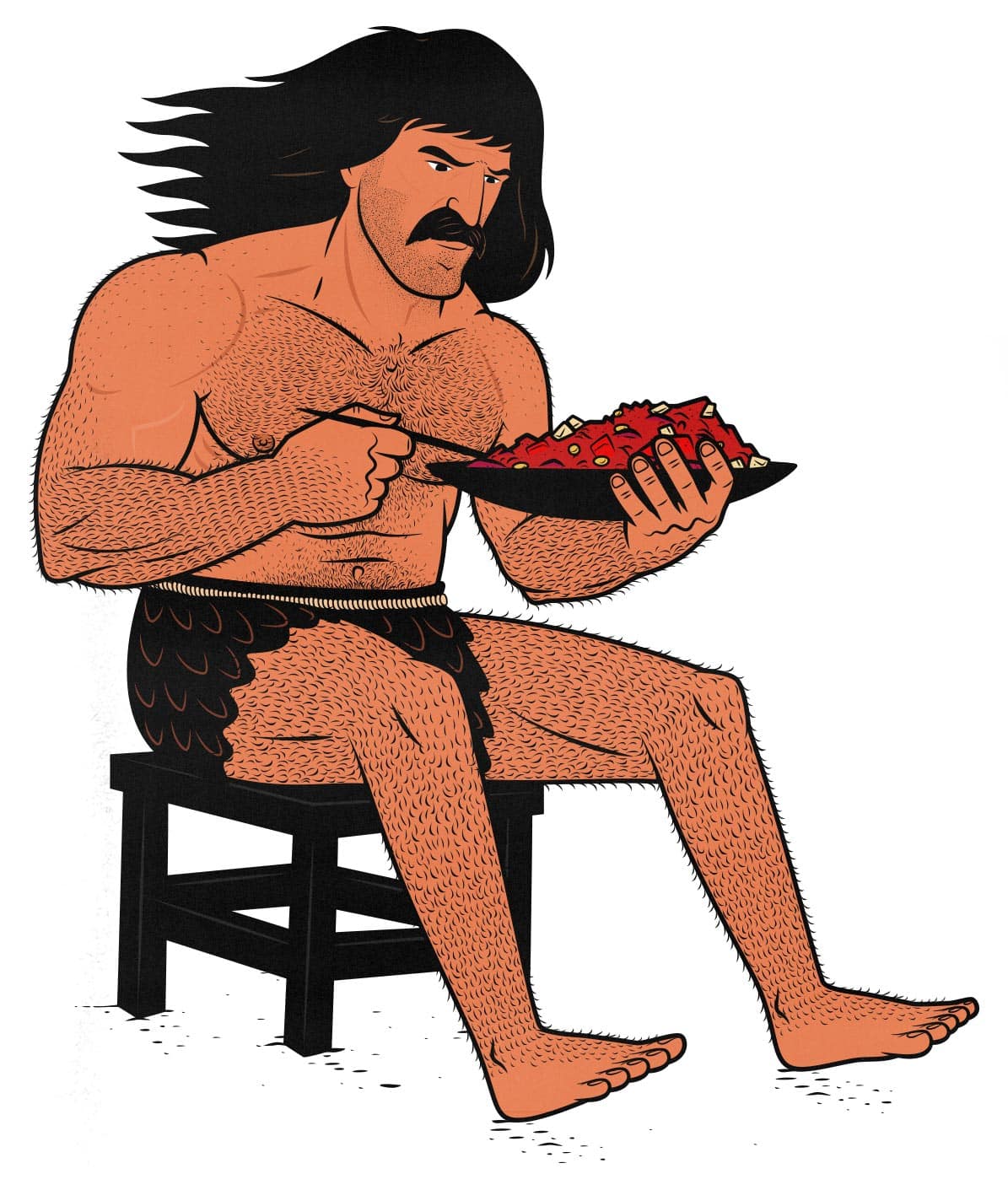
If you have a big stomach and a big appetite, you can get away with eating less often. But the fewer meals you eat, and the smaller your eating window gets, the harder it becomes to get your calories and protein in.
If you restrict your eating window too much, it probably starts to impair muscle growth a little bit (meta, study, study). And if you’re building muscle more slowly but keeping eating the same amount, then you’re more likely to gain fat. You can still build muscle while intermittent fasting, but it’s not quite ideal, especially if you’re naturally skinny (research breakdown).
As a naturally skinny guy who’s trying to bulk up, you may find that eating 3–6 meals (or snacks) per day works better for you. After all, skinny guys tend to have smaller appetites, smaller stomachs, and higher metabolisms. Eating like hobbits often suits us well.
Will Eating More Often Reduce Fat Gain While Bulking?
Let’s start by quickly going over how meal frequency affects muscle growth and fat gain while bulking:
- Eating more calories increases your metabolism, but meal frequency doesn’t really matter. If you eat small meals more often, your metabolism will go up by small amounts more often. If you eat big meals less frequently, then your metabolism will increase by larger amounts less frequently. So, as long as the type and amount of food eaten is the same overall, so is your metabolic response.
- Muscle catabolism (i.e. your muscles getting smaller) doesn’t begin until several days after your previous meal. As long as you stimulate your muscles with a couple of workouts per week(or more), fasting is unlikely to cause much muscle loss. Muscle growth turns off during longer fasts, though. Long fasts aren’t a good bulking strategy.
- Healthy bodies are incredibly good at maintaining proper blood sugar levels. That’s true whether you eat a bunch of small meals or a couple of bigger ones.
- Your body doesn’t need a steady drip of protein. Even just one meal can be enough to give your body the protein it needs for the day. Whey protein isolate digests at a bit more than 10g/h, so 30g of whey would take 3-4 hours to digest. If you get your protein from meat or casein, it would take more like ten hours to digest. Most protein sources fall somewhere in the middle (study). So even if you aren’t eating very often, your body has a fairly steady supply of protein.
- Is starvation mode real? There are a few things going on here. Your body probably won’t do much growing when you aren’t eating. So, if you’re trying to maximize muscle growth, then it does help to eat at least 3 meals per day. But eating less often won’t harm your metabolism or cause you to store extra fat.
How Many Meals Should You Eat Per Day?
If you have a big stomach and a robust digestive system, you might be able to get away with eating 1–2 meals per day. But if you want to fully maximize your rate of muscle growth, or if you find it hard to eat enough calories while bulking, try this:
- Eat breakfast shortly after waking up. If you wake up without an appetite, have a simple protein shake. I’ve got my favourite breakfast recipes here (including my favourite protein shake recipe).
- Eat at least a couple of meals or snacks throughout the day. Some of these meals can be really light and simple, like a handful of trail mix with a glass of milk. You don’t need to cook up a bunch of meals or waste a bunch of time eating. Here are some of my favourite bulking meals.
- Eat a small snack right before bed. If you fall behind on calories, you might need to eat a big meal before bed, but I would avoid it when you can. When you eat, your body produces heat as a byproduct of digestion, making you feel hot. That extra heat can make it hard to fall into a restful slumber. Lying down after a big meal can also trigger acid reflux.
- Stick to the same schedule every day. Nothing terrible will happen if you miss a meal, but your body prefers routine. It likes to rev up your hunger when it knows a meal is coming. It likes to prepare digestive enzymes ahead of time. Your digestive system will run much more smoothly if you let it plan ahead.
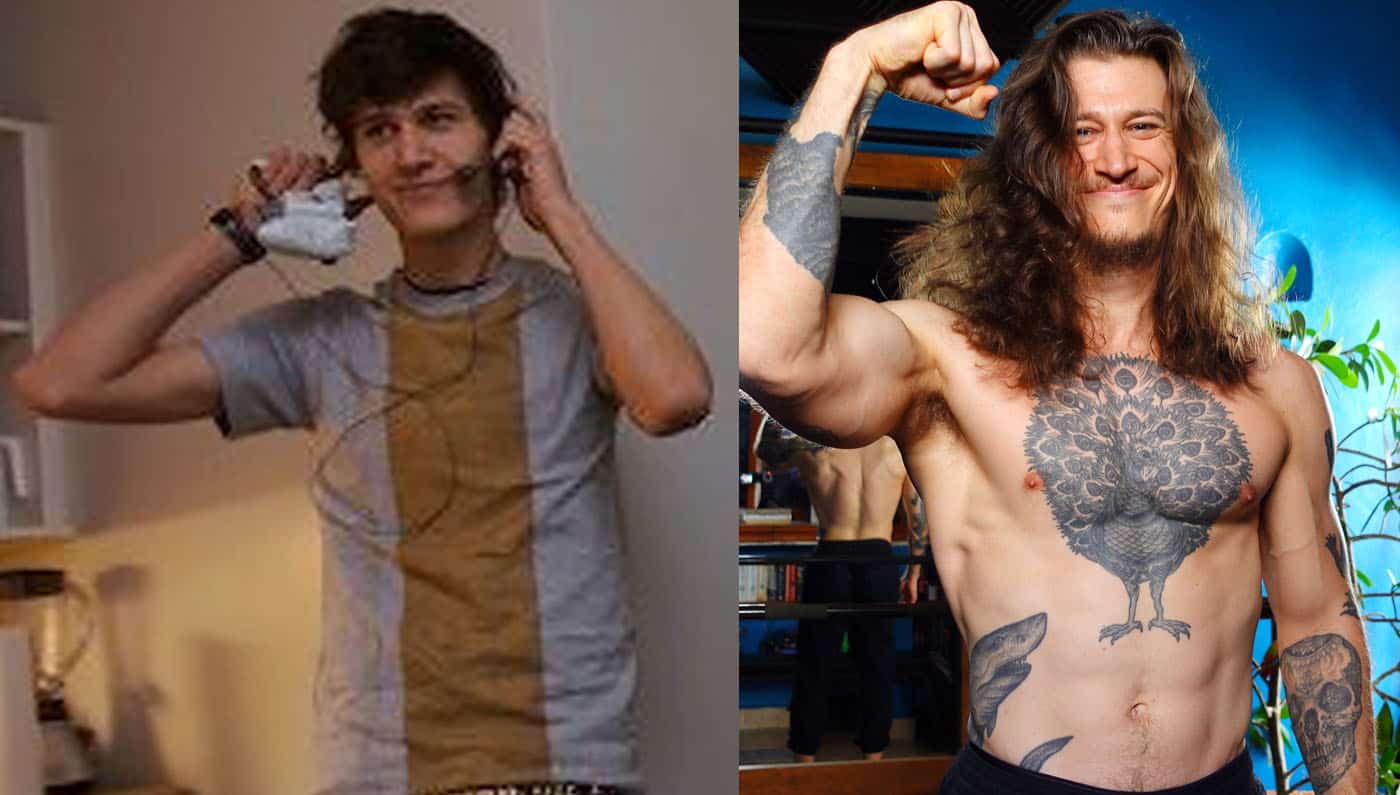
I gained 75 pounds from eating 4–5 meals per day, starting with a very light shake right after waking up. During the day, I’d eat a couple of snacks and a moderately-sized lunch and dinner. Then, right before bed, I’d have a light snack. I’ve got my favourite meal plan here.
If you want more, we have a full nutrition guide and recipe book included with our Bony to Beastly Bulking Program and Legends: Health & Aesthetics Program. We’ve got more breakfast recipes (like a homemade protein bar you can prep in bulk), and we’ve also got a bunch of great options for lunch and dinner, including our favourite meal-prep meals (where you cook a dozen servings at once).

We take this stuff seriously. We aren’t just trying to give you generically healthy bulking meals, we’re trying to give you enough of every macronutrient and micronutrient you need to build muscle, burn fat, improve your health, enhance your appearance, and maximize your performance.
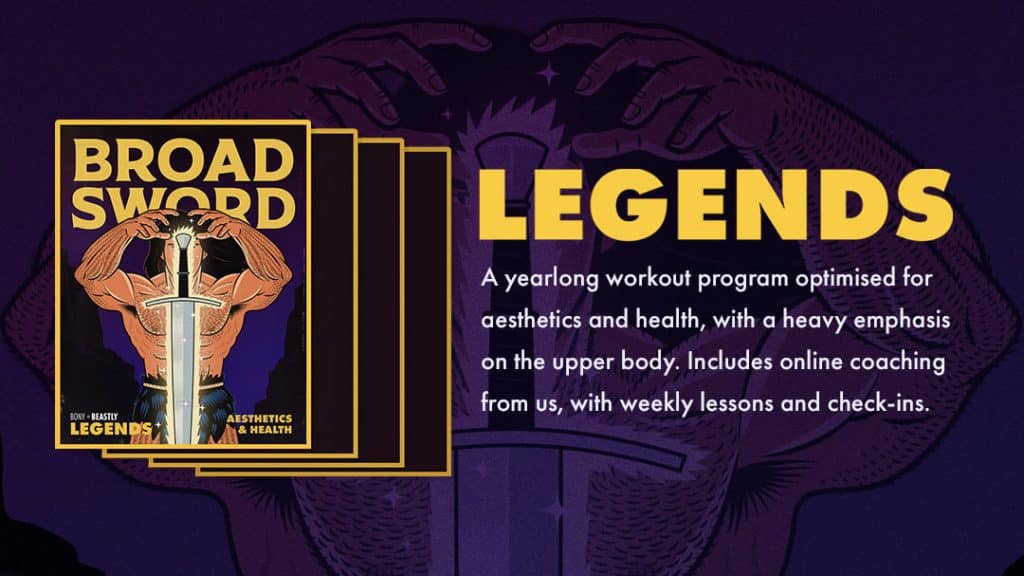
We can help you eat a great diet, whether you like intermittent fasting, low-carb, eat a plant-based diet, or have digestive issues (like IBD or GERD). Our nutrition guide and recipe book are great places to start, but both of these programs also come with one-on-one support in our online coaching community.
Alright, that’s it for now. Feel free to drop a comment if you have any questions.

